How Milwaukee faith leaders are answering the call to be a 'primary piece' of the city's plan to stop gun violence
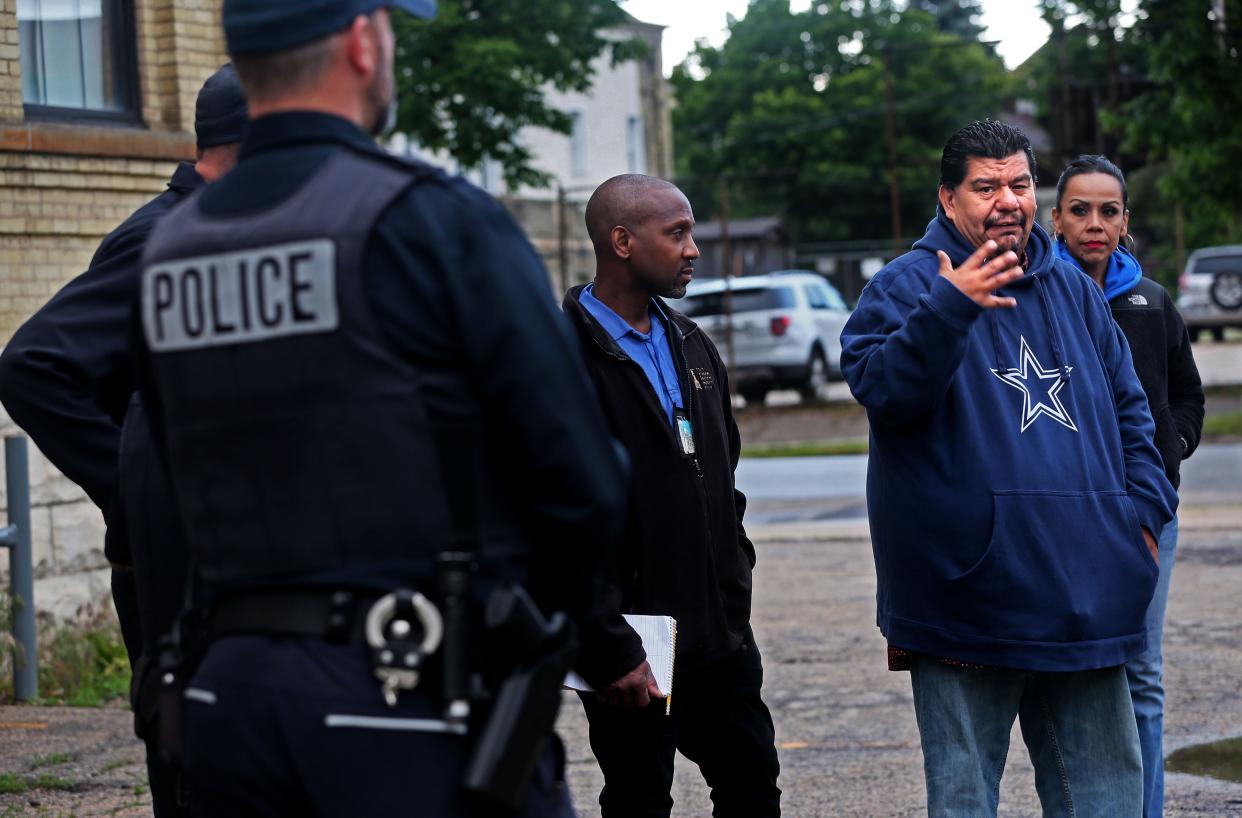
One afternoon in May, Pastor Marty Calderon stood in the middle of a street on Milwaukee’s south side, recording a video inviting residents to join him and Milwaukee police officers on an evening walk through the Lincoln Village neighborhood.
“Don’t be afraid. Don’t think, you know what, it’s at night; it’s getting dark,” Calderon said in the video, later posted to District Two’s social media accounts.
He'd organized the walk, set for the following day, with officers from Police District Two in response to recent violence in the area.
“We’re doing this for the community,” he told viewers. "We just want the community to know that we’re here to provide resources, and we’re here to provide outcomes to be able to make a change within these neighborhoods.”
Ten minutes after filming the video on South Fifth Place, a shooting rang out at the same location. It left a 32-year-old man, Arthur B. Williams, dead.
The walk went on as planned the next day. Calderon talked to neighbors about the shooting. Later, he met the victim’s wife and raised donations to pay two months of her rent.
It all built trust, he said, and proved to residents that he and his church were committed.
“The neighbors, they watch,” he said. “First they watch all these people coming together, walking the neighborhood. Then they watch the follow-up.”
To Calderon, the experience was a prime example of what he hopes his church, God Touch Milwaukee, can do in the city as gun violence surges.
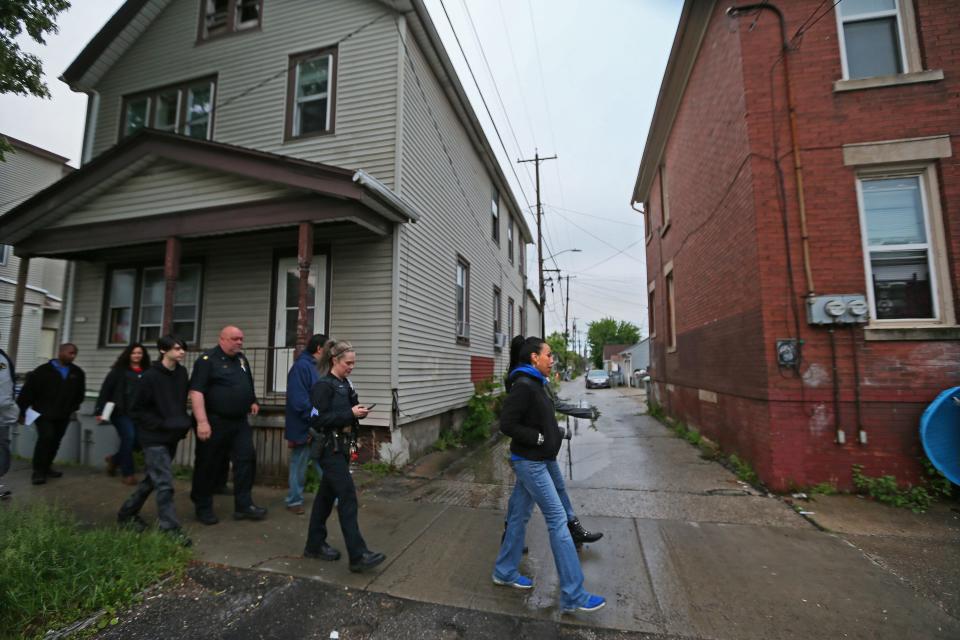
Homicides in Milwaukee are up 32% compared with the same time last year — when the city broke its record for the second year in a row. More than 110 people have died in homicides so far in 2022. There were 98 homicides in all of 2019.
Faith leaders have seen the effects of the rising violence first-hand.
Fear permeates their congregations, with some afraid to go out. Residents old and young feel hopelessness and isolation — which can lead to crime and other risky behaviors.
And these spiritual leaders are often the ones holding funerals for homicide victims.
Calderon and other local clergy have long believed they've been called to aid those who are struggling. In recent months, they've also received a secular calling: one from Milwaukee officials, asking them to step up to help prevent violence in the city.
In a town hall event for clergy held by the city’s Office of Violence Prevention in May, director Arnitta Holliman said the faith community was “a primary piece of prevention.”
And Mayor Cavalier Johnson, who has emphasized a community-wide approach to solving violence, repeatedly has urged faith leaders to get involved.
“It’s creating those connections in the neighborhoods. It’s working to be those stabilizing pillars, those stabilizing forces in bringing people together,” he said last month. “That’s what the faith community in Milwaukee is capable of doing.”
Local clergy recognize that preventing shootings is complex. But they remain optimistic that their diligence will pay off.
Some are getting out on the streets, like Calderon, while others are focused on making their churches safe havens for area residents. Still others have dedicated their energy to fulfilling people’s basic needs like food and housing.
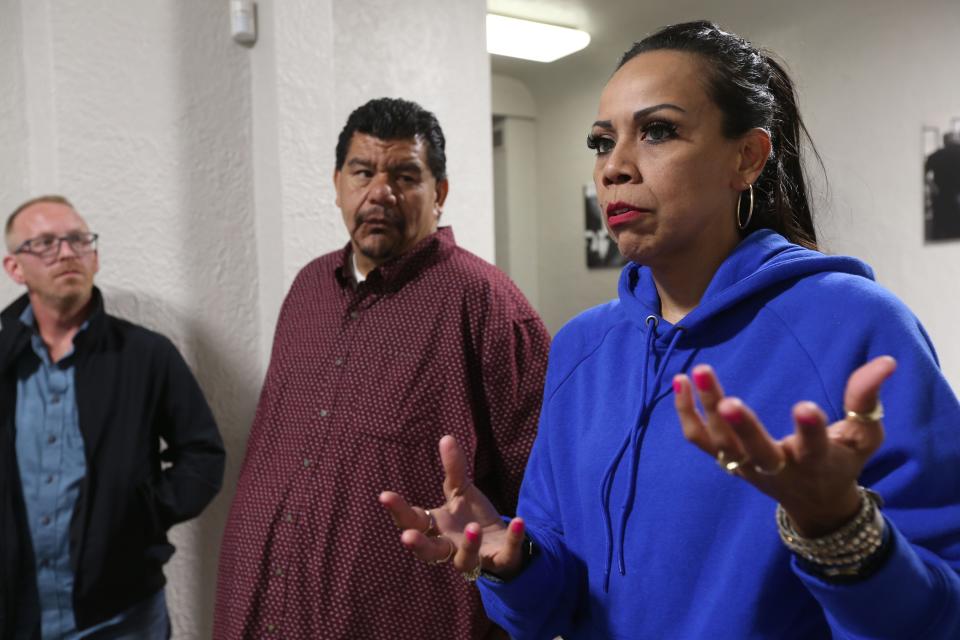
“We’re just trying to do our part,” said Veronica Diaz, a staff member at Calderon’s church. “We understand that we can’t fix everything by ourselves, but we sure can show people love.”
Neighborhood walks make police, pastors a visible presence
Calderon, a longtime fixture of the south side, recently began regular neighborhood walks with Milwaukee police and other community leaders. Meeting residents and listening earnestly has cascading positive effects in reducing crime and gun violence, he said.
“When you're building relationships with people that don't come to the community centers, with people that don't come to the churches, but you're meeting them where they're at, I'm telling you, it makes a huge difference,” he said.
Diaz, outreach events director for the church, grew up on the south side and sees how the neighborhoods have lost their cohesion in recent years. People used to pray together, know the names of their neighbors and could safely ride their bikes at night, she said.
She hopes church-led events this summer such as neighborhood walks, food pantries and outdoor festivals help forge those connections once again.
“We want to go back to those things where we know our neighbors, our neighbors feel safe (and) they know that the door is always open to them and anything that they need,” Diaz said.
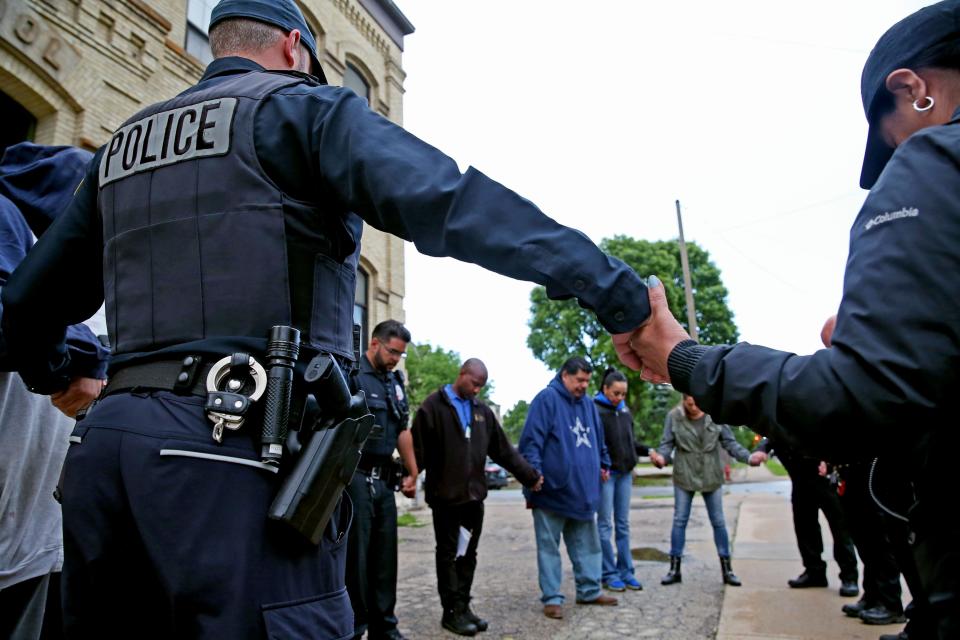
A cornerstone of Calderon’s vision for a safer city is a good relationship between faith leaders and the police department. District Two Capt. Patrick Pajot agrees. It’s why he tries to round up a handful of officers for each neighborhood walk with Calderon.
“By us getting out here, getting to know the neighbors, that makes the neighbors a little bit more apt to talk to us when there’s gun violence in the neighborhood,” he said. “They feel comfortable with us.”
There’s also power in simply being seen hitting the pavement, said Willis Neal, a city inspector who joined the group on a walk last month.
“It’s kind of letting them know that you’ve got eyes out here … letting them know that this is not permitted in the neighborhood,” Neal said. “Crime goes where it is allowed.”
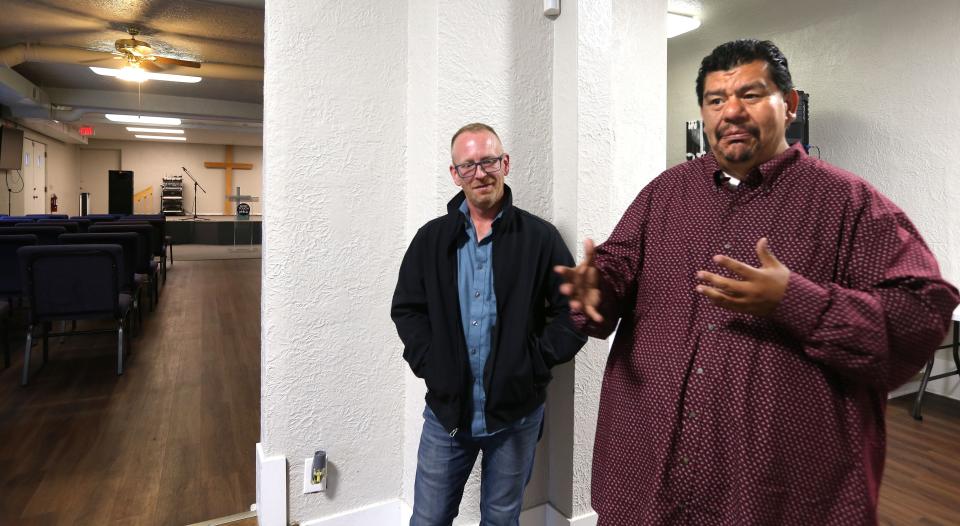
Pastors offer programming, safe spaces at church
For some Milwaukee faith leaders devoted to preventing gun violence, the focus is on making their churches safe spaces for area residents.
The Rev. Robert Bell, Milwaukee campus pastor for Life Church, believes every church should have programs to engage youth and to help people with mental health.
Kids in the neighborhood around Life Church, at 5511 W. Burleigh St., often see the children and teens in the church’s youth program playing games outside, and they join in, Bell said
“The kids in the neighborhoods should know that there is a church on that corner and that that's a place they can go to,” Bell said.
He’s always inviting people to join the weekly men’s groups, women’s groups and Bible studies the church hosts.
“Just having somewhere that people can come and talk and build relationships and let this stuff out” is important, Bell said.
After funerals for homicide victims, Bell often tries to chat with the young people in attendance. He hands out his cards, encouraging them to come to church and telling them about the men’s group and the youth program.
“I always tell them that there’s hope,” he said.
As a young teen, Bell got involved with gangs and began abusing drugs and alcohol. At 20, he went to prison for armed robbery. Once he was released, Bell said, he turned again to violence and alcohol. Along the way, he lost his brother and a few cousins to homicide.
A faith-based treatment program inspired him to change his life and become a pastor. The experience has shaped how he serves his community.
“God turned me and my life around and put me right back in the same neighborhoods. And I can identify (with people),” he said. “That's what makes our church effective.”
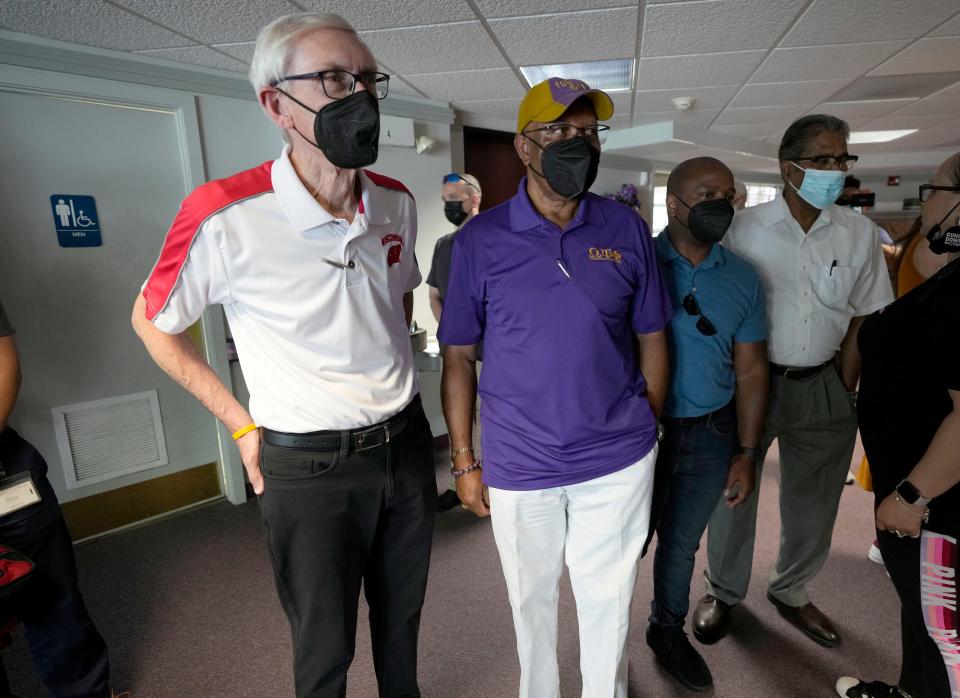
A number of local faith leaders believe it’s important to make their churches welcoming places for those in need.
Tabernacle Community Baptist Church, 2500 W. Medford Ave., has the word “community” in its name as a reminder of its purpose, said the Rev. Donna Childs.
“Our goal has always been, and continues to be, to really attempt to be a church for that community,” she said.
Earlier this year, Childs and members of the church, which is based in the Amani neighborhood, took Mental Health First Aid training to learn about mental health issues and substance abuse.
Childs wanted to know what to do in case a congregant, a family member or someone on the street outside the church had a mental health crisis.
“I just wanted us to be proactive as opposed to reacting to someone that may come into our church with challenges,” she said.
In the next year, the church plans to devote more energy to teaching young children how to resolve conflicts. If kids learn how to calmly handle problems at 4 or 5 years old, they might not pick up a gun at 12 or 13, Childs said.
“Hopefully it will deter some of the violence because they have something to work with,” she said. “I believe that if it’s planted early enough, it stays with you.”
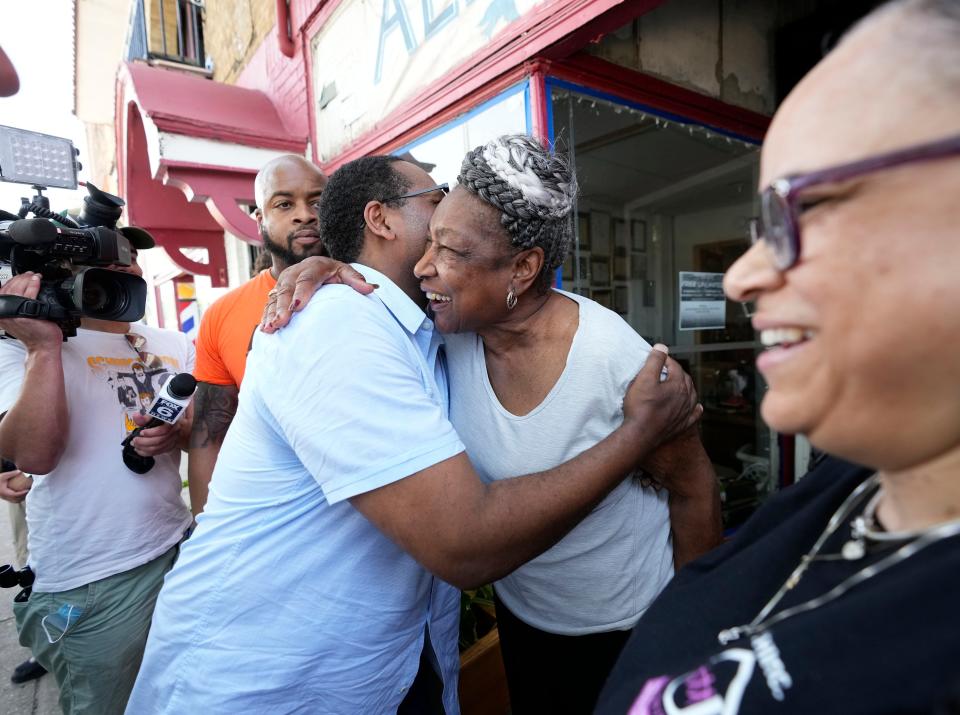
Helping people in need affects overall wellbeing of neighborhood
Other local advocates aren’t as focused on making the church a destination for those in trouble. They are guided by their faith, but they aim to meet people at their place in life and help with basic needs.
This is Farina Brooks’ philosophy. She leads Dream Team United MKE, a faith-based organization that hosts food pantries and community resource fairs across the city.
“We understand that you can't come out in a manner of beating the people over the head with the Bible,” Brooks said.
Brooks’ goal is to help people with the realities of their lives: finding them a place to stay, or providing food for their children. Fulfilling these needs, and showing some compassion, Brooks believes, will have an impact on the overall safety and wellbeing of neighborhoods.
“A lot of people think that this is all about giving out the food. But it’s not. There’s more to it than that,” Brooks said. “It's really building relationships with people, letting them see that there are people out here that really do care, that we are concerned.”
In conversations with people she’s helping, if the circumstances are right, Brooks might bring up her own story to share.
In the past, Brooks survived a suicide attempt and a domestic violence relationship. She was an alcoholic and used drugs.
“It wasn’t until I got back in church that I realized, I went through all these things … because (God) wanted me to get to where I am today,” she said.
Sometimes, she walks up to people on the street that “most people might be scared to say something to.”
“I’m that person to say, ‘Hey, how you doing, young man? You doing OK? You live over this way?’ Just carrying on a conversation with them. Because sometimes that’s a lasting impression on them.”
Brooks understands why people can be wary of evangelization. She grew up in the Church of God in Christ and likes to tell people she was taught religion — what to do and what not to do — instead of relationships.
It’s why she tries to approach each interaction with someone in need humbly and without judgment.
“We’ll both be crying together. To me, that’s what it means to build a relationship. Because they know then that you are genuine,” she said.
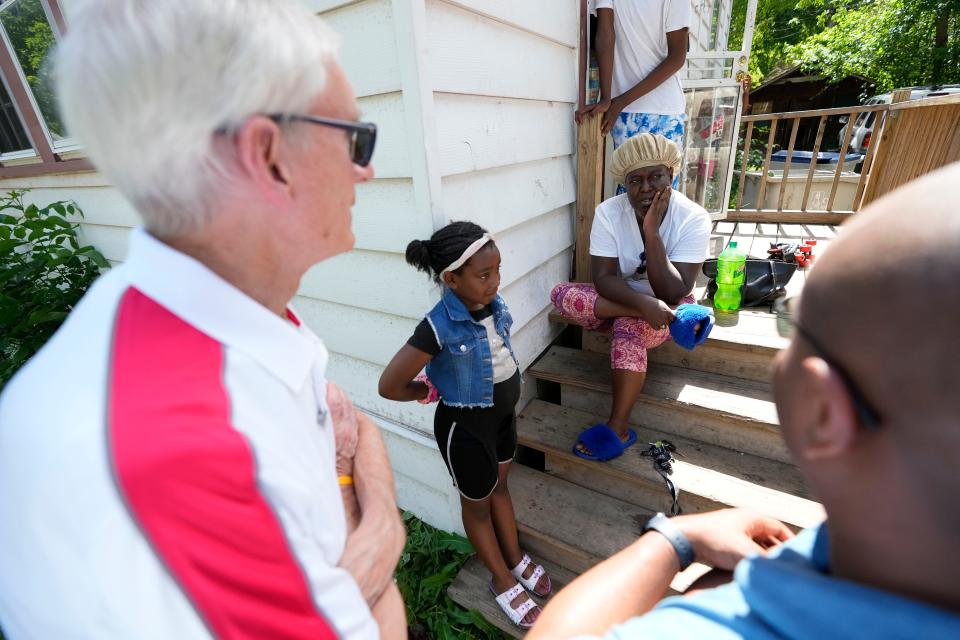
The Rev. Raymond Monk, pastor of Ephesians Missionary Baptist Church, 2412 N. 6th St., is another who might approach someone on the street and offer to help them.
In a recent case, he started talking to a young woman engaging in prostitution and using drugs. Within three hours, he’d helped her check into a detox center.
But Monk knows it’s not something all faith leaders could do. Often, pastors of small churches also work full-time jobs in another field. Because they can’t attend daytime meetings, they aren’t as plugged in as others to anti-violence programs and resources, Monk said.
“When you come across people who have needs, if you don't know how to help them, you’re going to stay away from it,” he said.
Monk, who is a member of the Office of Violence Prevention’s faith collaborative, is working on a way to keep under-informed pastors up-to-date on how to help people in need.
“You’ve got to help coach these individuals on how to engage their community,” he said.
Churches 'do care,' but face hurdles
Small churches are often working with limited budgets funded by donations. And for clergy who also work other jobs, they tend to devote their free time ministering to those within the church, Monk said.
Geography compounds the disconnect some pastors face. Often, members of a church don’t live in the neighborhoods where they attend services.
In those cases, going to church can be “transactional,” Monk said. “There’s no deep-rooted investment in changing the neighborhood.”
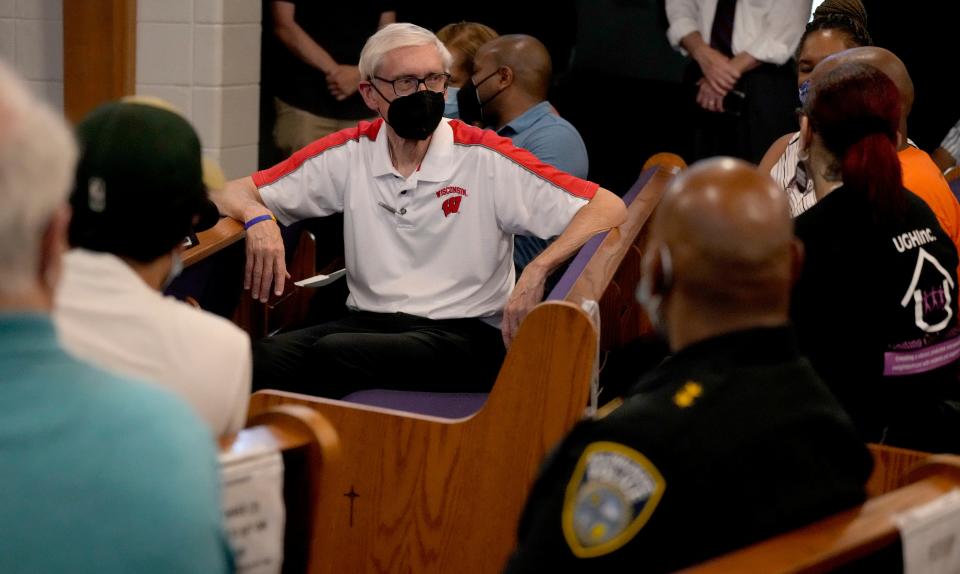
And as much as faith leaders agree that reaching out to their neighbors will make neighborhoods safer, there’s often a lack of collaboration between denominations and congregations.
Tynnetta Jackson, director of the faith-aligned organization SOULS, aims to bridge some of those gaps. She holds informational sessions for pastors on everything from who’s running for office to how to participate in community events, and in June she hosted a meeting for pastors to discuss solutions to gun violence.
“I got tired of hearing the church don’t care,” she said. “We do care. We just need to know what resources, what’s available, and how to get to those resources.”
One pastor isn’t going to eradicate gun violence entirely. But they can make a measurable difference with the actions they do take, said Bell, of Life Church.
“You can't do everything, but I do believe that every church should be doing something,” he said. “I think we are a big part of the solution.”
Contact Sophie Carson at (414) 223-5512 or scarson@gannett.com. Follow her on Twitter at @SCarson_News.
This article originally appeared on Milwaukee Journal Sentinel: Milwaukee church leaders say relationships are key to end gun violence

